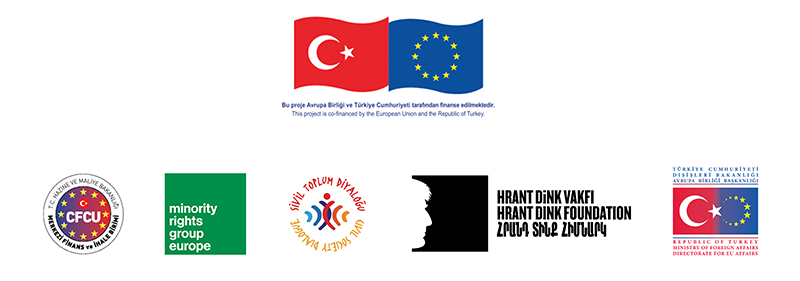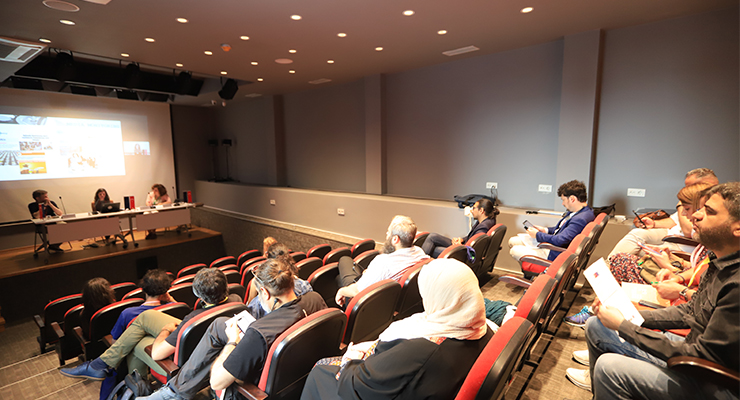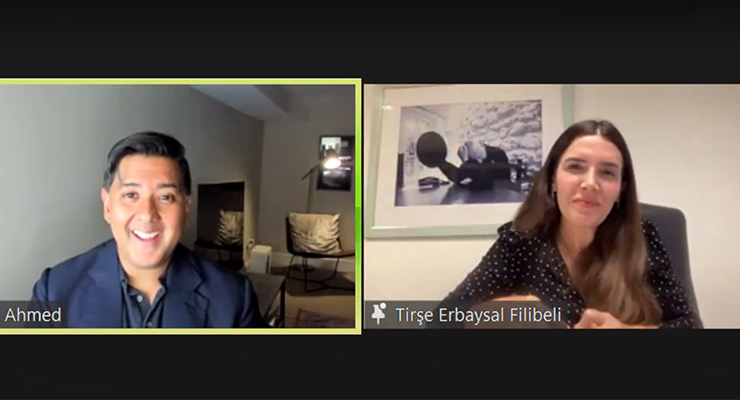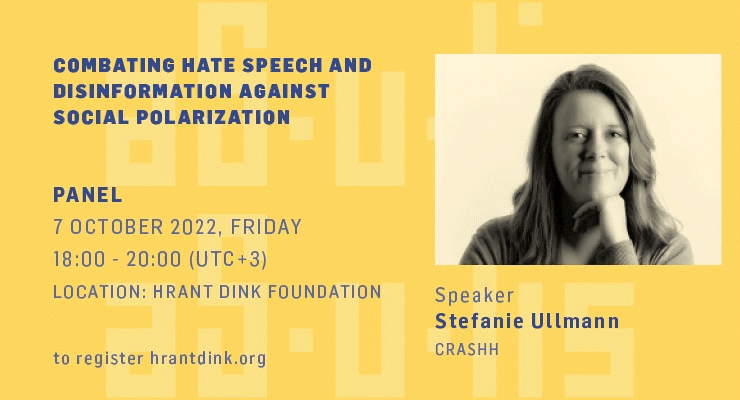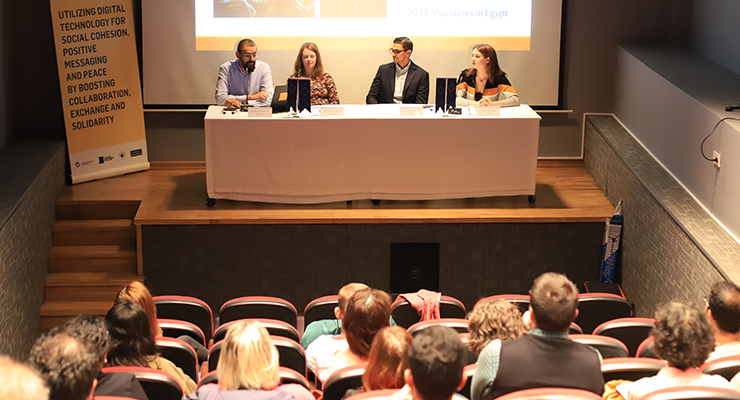On Friday, 17 June 2022, the “International Conference on Countering Hate Speech in Media” was held at the Hrant Dink Foundation, Havak Hall with the attendance of the project’s participating CSOs, individuals and institutions from both Turkey and Europe that work on discrimination, democracy, equality, human rights, discriminatory discourse, and hate speech. The goal of the conference was to provide a platform to exchange knowledge and experience, build joint communication networks, and strengthen interinstitutional collaborations to counter hate speech.
The conference was the final activity of the “Learning and Collaborating on Countering Hate Speech in Turkey and new EU Member States” project which has been carried out under the joint coordination and collaboration of the Hrant Dink Foundation and the Minority Rights Group Europe and with the financial support of the European Union.
The conference was broadcast live on Youtube, Facebook, and Twitter accounts, as well as the Hrant Dink Foundation's website, in Turkish and English.
Opening Speech: Ülkü Doğanay who delivered the opening speech of the conference elaborated on how the media should be used to combat hate speech more effectively. Doğanay, who also talked about the principle of good journalism, touched upon the importance of fact checking and of being independent and fair. In addition, Doğanay mentioned the alternative media that take their strength from the fight against discrimination, and noted that we could develop media practices for them.
Panel 1: In the first panel of the conference moderated by Nazan Haydari, the issue of online hate speech in Turkey and Europe was discussed. The first speaker Giulia Dessi from Media Diversity Institute, shared the information about the “Get The Trolls out” project, a media monitoring project focusing on the dissemination of anti-religious hateful narratives in the media and in particular the anti-Semitic narratives in anti-vaccine discourse in Belgium, France, Germany, Greece, Hungary, Poland and the United Kingdom. The second speaker, Dr. Peter Weisenbacher, Director of The Human Rights Institute, made a presentation on hate speech in the Central European countries. The third speaker, Dr. Suat Atan, one of the founders of Turnusol.org, made a presentation titled “Turnusol.org: Testing the Use of Artificial Intelligence to Detect Hate Speech”. He stated that they were trying to develop an artificial intelligence to detect hate speech targeting refugees and minorities in Turkey.
Panel 2: The second panel titled “Disinformation, Antisemitism, Islamophobia, Anti-Immigration and Anti-Roma Movements” was moderated by Didar Akar. The first speaker, Nabil Sanaullah made a presentation titled “Disinformation and Media: The Normalization of Hate Speech in Europe”. The second speaker Peter Kovacs explained the disinformation ecosystems in his presentation titled “The Impact of Disinformation Campaigns About Migrants and Minority Groups in the EU- Anti-Muslim Populism in Hungary”. In her presentation titled "Countering Online Hate Against Roma in Bulgaria", the third speaker, Teodora Krumova, talked about the groups (Turks, Arabs, Roma, Chinese, etc.) that were the target of hate speech in Bulgaria. The last speaker of the second panel, Dr. Gülay Uğur Göksel made a presentation titled “Recognition Theoretical Analysis of Negative Perception and Hate Speech towards Syrian Refugees in Turkey.” She explained that they were trying to find out how we could understand the sources of negative perception and attitudes, that they thought a different theory was required for this, and that’s why they designed their research through the recognition theory.
Panel 3: The third panel titled “Freedom of Expression and Hate Speech” was chaired by Tirşe Erbaysal Filibeli. The first speaker Joanna Szymanska from Article 19, emphasized, as a fundamental right, freedom of expression should be ensured by governments in her presentation titled “Identifying Hate Speech”. The second speaker Katarzyna Morton from Human Rights Advocacy Consultant for Minority Rights Group International mentioned how mainstream and online media feed each other in her presentation titled “Ethics in the Real World: Between Accountability and Freedom of Thoughts”. In his presentation titled “Abuse of Hate Speech Provisions in Turkey: Criminalization of Religious Hate Speech or Blasphemy?”, the last speaker Kerem Altıparmak gave interesting examples from court decisions in Turkey illustrating how, in an authoritarian regime such as Turkey, a court ruling on hate speech may both fail to combat hate speech and turn into an instrument of it at the same time.
Panel 4, Part I: The fourth panel titled “Countering Online Hate Speech: Methods, Strategies and Campaigns”, consisting of two parts, was chaired by Ayşecan Terzioğlu. The first speaker Tamás Berecz from International Network Against Cyber Hate mentioned methods of countering discourse in his presentation titled “The Dangers of Hate Speech and Methods to Fight It”. The second speaker Amanda Morris from Stop Funding Hate focused on the financial dimension of hate in her presentation titled “How to Stop Funding Hate: Harnessing the Power of Social Media for Effective Change”. Melissa Sonnino from Facing Fact, the last speaker of the first part of the panel, talked about the campaigns of "Facing Fact" in her presentation titled “Facing Facts online- Action and Learning”.
Panel 4, Part II: In the second part of the fourth panel the first speaker was Ebru Özdeş from Hrant Dink Foundation. In her presentation titled “Hate Speech and Inclusive Language”, she gave a brief outlook of the Foundation’s activities to combat hate speech over the years. The second speaker Menno Ettema from the Council of Europe Experts Committee on Combating Hate Speech touched upon some useful tools to combat hate speech in his presentation titled “Council of Europe: Comprehensive Approach to Combating Hate Speech”. Finally, Gabriele Baratto from the University of Trento and Hatemeter.eu Project explained the Hatemeter project in his presentation titled “An ICT Tool for Monitoring, Analyzing and Tackling Online Hate Speech: The Experience of the Hatemeter Project”.
On Saturday, June 18, roundtable discussions were held in two sessions. In the discussions, the participating CSOs shared how they experienced hate speech in their respective fields, how they combatted hate speech, the challenges they faced during their struggles, what they did to overcome these challenges, and how the existing collaboration between different sectors as well as new types of collaborations in the field of combating hate speech could be strengthened.
We would like to thank all the national and international participants who made this two-day conference possible and helped the conference reach its goal; the Minority Rights Group Europe for their collaboration; the European Union for their financial support; all the audience and guests who followed and contributed to the conference with their questions and comments; and all the staff and volunteers of the Hrant Dink Foundation who worked hard to make this conference happen.
